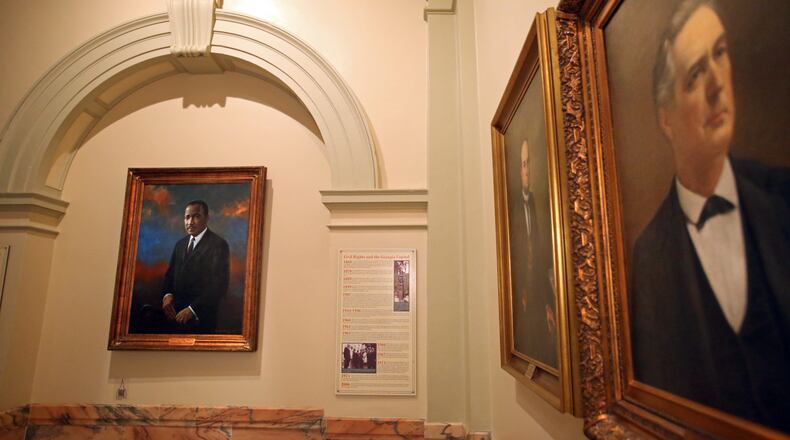Martin Luther King Jr.’s statue will soon rise on the statehouse grounds, just a few steps from the new Liberty Plaza where protests and demonstrations are now held.
State Rep. Calvin Smyre, a Democrat tasked with coordinating the statue, told the Georgia Building Authority Monday that the eight-foot statue will be atop a three-foot base and include inscriptions from the civil rights leader on all four sides. It will overlook the busy road that bears his name, a short walk from the new Liberty Plaza.
The $300,000 statue is years in the making, but the latest update comes at a tumultuous time. Georgia is wrestling anew with its Confederate heritage in the wake of the murders of nine black worshippers at a Charleston church by a white man who told police he wanted to start a race war.
Democrats are urging the state to quit celebrating Confederate Memorial Day and Confederate Heritage Month, and the state has stopped selling license plates with the battle emblem after Deal announced a “redesign” of the tags. The Sons of Confederate Veterans, meanwhile, has threatened legal action if Deal’s administration refuses to sell the plates.
The King memorial, which Gov. Nathan Deal first announced last year and repeated in his inaugural speech, comes after years of lobbying from black leaders to put King’s visage on the statehouse grounds.
“This is long overdue, but that doesn’t mean I’m not excited about what we’re doing,” said Smyre, who has served more than 40 years in the Legislature. “I take pride in what we’re doing.”
The sculptor is Andy Davis, a Georgia artist whose signature work so far is a life-size bronze statue of Ray Charles that sits in Albany, the famed singer’s birthplace. It will likely take six to seven months for Davis to finish the job, meaning it could be ready around the same time lawmakers return to the Capitol.
“I am confident that Andy Davis’ past works, including a statue of Ray Charles in the singer’s hometown of Albany, have prepared him well for this historic project,” Deal said.
King’s physical presence at the statehouse is now limited to an oil portrait that’s flanked by a biographical display. After Deal signed an order in 2013 to remove a statue of Tom Watson, a segregationist U.S. Senator known for his racist attacks on blacks, several Democratic leaders pushed him to replace it with a statue of King.
The effort was delayed in 2014 – it was an election year after all – but an agreement was recently struck between the state and the King family’s intellectual property attorneys. That was no easy task, as King’s surviving children have long been locked in a messy legal fight over their father’s legacy.
About the Author
Keep Reading
The Latest
Featured


